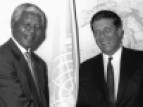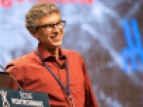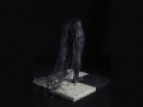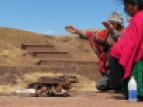
Audrey Azoulay: Making the most of artificial intelligence
cou_03-18_dg_itw_01.jpg

Artificial intelligence (AI) could help humanity overcome many of the serious social problems it faces. But at the same time, AI presents a series of complex challenges, particularly in terms of ethics, human rights and security. Yet, no international ethical framework that applies to all AI’s developments and applications currently exists. An international regulatory tool is indispensable.
Audrey Azoulay, Director-General of UNESCO, interviewed by Jasmina Šopova
Why is UNESCO interested in AI?
The experts are unanimous: humanity is on the threshold of a new era. Artificial intelligence will transform our lives to an extent that we cannot imagine. This transformation has already begun and it affects all aspects of our lives. AI has many applications in fields as varied as health, education, culture, security, defence, etc. Research has increased considerably in recent years: the giants of the web, FAMGA, but also many countries, are now investing massively in AI, and becoming actors of this “Fourth Industrial Revolution”.
UNESCO has a significant role to play in these changing times. First, because AI’s applications directly affect the Organization’s areas of expertise. Education will be profoundly transformed by AI. Teaching tools, ways of learning, access to knowledge, and teacher training will be revolutionized. The question of what skills to develop in order to evolve in an increasingly automated world will become more and more central.
In the field of culture, AI is already widely applied: for example, 3D imaging is used for heritage reconstruction – as we will do for the old city of Mosul in Iraq. In the sciences too, particularly in our environmental programmes and in underwater research – for the classification of plankton images or the automatic detection and census of cetaceans and seabirds, for example. Communication and information are also directly dependent on advances in AI. UNESCO must lead this reflection on the benefits and risks of AI in education, culture, science and communication and information.
What are the risks, in your view?
In general, AI can be a fantastic opportunity to achieve the goals set by the 2030 Agenda, but that means addressing the ethical issues it presents, without further delay. An opportunity, because its applications can help us to advance more rapidly towards the achievement of the Sustainable Development Goals (SDGs) – by allowing better risk assessment; enabling more accurate forecasting and faster knowledge-sharing; by offering innovative solutions in the fields of education, health, ecology, urbanism and the creative industries; and by improving standards of living and our daily well-being. But it is also a threat, because automation and digitization create new imbalances. They can decrease diversity in cultural industries, disrupt the labour market, create job insecurity and increase disparities between those who have access to these new technologies and those who are deprived of them.
This is where UNESCO also has a role to play – in trying to reduce the inequalities in access to knowledge and research – through the support it provides to its Member States. The technological divide is likely to have a multiplier effect on social inequalities. UNESCO must be able to help its Member States adapt to new realities and access technological knowledge.
How can UNESCO provide this support, concretely?
One of the challenges for Member States is to have sophisticated, cutting-edge engineering materials and adequate human resources – scientists and engineers. Through its Centres for Education and Training in Science, Technology and Innovation (STI), its Global Observatory of Science, Technology and Innovation Policy Instruments (GO-SPIN) and its International Basic Sciences Programme (IBSP), UNESCO is in a position to provide such support – and to help reduce disparities between countries.
What are the challenges posed by AI in education? How does UNESCO intend to respond to these?
This is, of course, a key area for the Organization. Here again, the revolution that is now underway is generating both positive and negative effects.
Educational software based on AI is already being used to decentralize teaching and personalize it, and to provide students with curriculum advice, or even certification. But these technologies are expensive and therefore inaccessible to the great majority – the gap between rich and poor is likely to widen even further.
As a result of its coordinating role in the SDG-Education 2030 Steering Committee to monitor the achievement of Sustainable Development Goal 4, dedicated to education, UNESCO is in an excellent position to lead this work – by identifying the possible contributions of AI to inclusive education and assessing its potential impact on the future of learning.
Promoting open-access AI tools that will encourage local innovation will be one of our priorities.
To prepare future generations for the new landscape of work that AI is creating, it will also be necessary to rethink educational programmes, with an emphasis on science, technology, engineering and mathematics – but also giving a prominent place to the humanities and to competencies in philosophy and ethics.
What is the relationship between AI and philosophy or ethics?
In their adult lives, today's schoolchildren and students will undoubtedly have to face problems that are currently unfathomable to us. It is difficult to predict all the possible developments of these increasingly sophisticated machines that are gaining a little more autonomy each day – to the point of already challenging human identity, to a certain extent. This is why skills in ethics, but also in the social sciences and the humanities in general, will be just as important as those in the formal sciences. There may also be embedded biases – including gender biases – in AI systems, that require more transparency from these systems and strong ethical principles to correct them.
Why is it difficult to predict future developments in AI?
Research in the field of AI is advancing at a very rapid pace, while the legal, social and ethical environments that are needed to guide it are evolving very slowly. How far can a machine’s autonomy and its decision-making power be allowed to go? If an accident occurs, who is responsible? And who decides what values are instilled in machines during what is called their “training”? These and many other questions remain unanswered today.
It was noticed, for example, that algorithms trained in ordinary human language had acquired prejudices based on stereotypes from textual data present in our everyday culture. How can we not be concerned about the danger of the emergence of machines with discriminatory, racist or hostile behaviours?
There are also many other reasons to be concerned about – privacy protection and targeted advertising on the internet; freedom of expression and censorship algorithms; automated journalism and information monopolies, etc.
Even if fundamental research in this field is largely motivated by well-being, unintentional, but also intentional, deviations are always possible. That is why it is imperative to ensure that this technology develops according to rigorously established ethical standards.
What can UNESCO do in this regard?
If we are to make the most of the possibilities offered by AI to the world, we must ensure that it serves humanity, with respect for human dignity and human rights.
Yet, no international ethical framework that applies to all AI developments and applications currently exists.
UNESCO is this unique universal forum with over twenty years of experience in developing international instruments related to bioethics and the ethics of science and technology*. It can also rely on the expertise of two advisory bodies working actively on these issues: the World Commission on the Ethics of Scientific Knowledge and Technology (COMEST) and the International Bioethics Committee (IBC).
It is our responsibility to lead a universal and enlightened debate – not a technical debate, but an ethical one – in order to enter this new era with our eyes wide open, without sacrificing our values, and to make it possible, if Member States so wish, to establish a common global foundation of ethical principles.
Robots and Ethics
Whose AI is it anyway?
Read more:
Universal Declaration on the Human Genome and Human Rights (1997)
International Declaration on Human Genetic Data (2003)
Universal Declaration on Bioethics and Human Rights (2005)
Declaration of Ethical Principles in relation to Climate Change (2017)



























